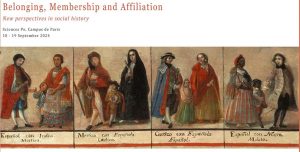Belonging, membership, affiliation. New perspectives in social history
 18 et 19 septembre 2024
18 et 19 septembre 2024
Workshop
Présentation
Cet événement est le fruit d’un partenariat entre les Joint Centers de Paris, Cambridge et Harvard, avec le soutien de l’ERC Lubartworld. Deuxième temps d’une réflexion collective sur les renouveaux de l’histoire sociale, initiée à l’University of Cambridge en septembre 2023, cet atelier vise à réfléchir à une notion désormais centrale dans l’histoire sociale : les appartenances. Que veut dire “appartenir” à un lieu, un quartier, un peuple, une famille, une religion ou une « race » ? Comment les individus ont-ils prouvé, affiché, déclaré, ressenti, et parfois caché ou dissimulé leurs appartenances ? Cette rencontre vise à promouvoir un dialogue entre différentes historiographies nationales, dans une perspective interdisciplinaire, afin de réfléchir aux outils, aux approches et aux méthodes utilisés par les historiens du social pour étudier les appartenances dans des contextes locaux, nationaux, coloniaux et impériaux. Les contributions exploreront des terrains variés, du Pérou sous domination espagnole à l’Espagne de Franco, des prisons françaises aux persécutions des Juifs en Pologne au XXe siècle, des apprentis français du XIXe siècle jusqu’aux villes informelles brésiliennes.
This international workshop is the second part of a project initiated in September 2023 at the Center for History and Economics at the University of Cambridge on new perspectives and current challenges in social history. This first event helped to bring to the fore an issue that is now central to much social history work: the study of ‘belonging.’ Rogers Brubaker’s and Frederick Cooper’s proposal (‘Beyond Identity’, 2000) to disentangle the notion of ‘identity,’ by distinguishing the logic of identification and forms of belonging, or categories of analysis and categories of practice, is still relevant today. But it has to be said that identification practices – particularly those of states – have been more widely studied than forms of belonging. Returning to this notion seems to us to be all the more relevant from a scientific point of view, given that political debates remain saturated with questions of identity.
Promoting dialogue between national historiographies, this meeting aims to bring together contributions that propose to reflect on the tools, approaches, and methods used by historians to study the question of belonging in local, national, colonial, or imperial contexts, as diverse as Peru under Spanish domination, Franco’s Spain, French prisons in the 20th century, the persecution of Jews in Poland, apprentices in the 19th century, or informal towns in Brazil. What did it mean to ‘belong’ to a place, a neighborhood, a people, a family, a religion, or a ‘race?’ How did individuals prove, display, demonstrate, experience, and sometimes conceal or dissimulate their ‘belongings’ or ‘memberships?’ How should we observe, measure, interpret, and address these aspects as historians? What theoretical frameworks can historians usefully apply to these issues? What are the contributions and limits of the various methodologies used by social historians (quantitative methods, biographical studies, family history, oral history, etc.)? And what contributions can social historians bring to these debates on identities?
This event is supported by the Joint Centre for History and Economics at Paris, Harvard and Cambridge, and the ERC Lubartworld (IHMC-CNRS/EHESS) and organized by Elsa Génard (Harvard University), Renaud Morieux (University of Cambridge), and Claire Zalc (CNRS-EHESS).
S’inscrire avant le 13 septembre : Formulaire
Programme
Wednesday, September 18
9:30am: Welcome/Coffee
9:45am: Opening remarks (David Todd, Sciences Po Paris)
10:00am: Introduction (Elsa Génard, USPN ; Renaud Morieux, University of Cambridge ; Claire Zalc, CNRS/EHSS)
10:30 am – 12:30 am. Panel I. Rethinking the Notions of ‘Belonging’, ‘Membership,’ ‘Affiliation.’
Discussant : Paul-André Rosental (Sciences Po Paris)
Simona Cerutti (EHESS): The Attribution of Citizenship Rights in Early Modern Europe: Beyond Principles of Membership
Jean-Paul Zuñiga (EHESS): Subjects of a Distant Monarch: Colour, Extraction and Quality in Hispanic America in the Early Modern Period
Quentin Deluermoz (Université Paris Cité): Temporalities, Revolution and Social Logics of Belonging: The example of the Paris Commune
12:30 pm – 2:00 pm.Lunch
2:00 pm – 4:00 pm. Panel II. Places and Belonging
Discussant: Charlotte Vorms (Paris 1 Panthéon-Sorbonne)
Anne Irfan (UCL): Connecting Time and Space: The Palestinian Refugee Camps
Daniel Widener (UCSD): Corner Stories: Place and Time in South Central Los Angeles
Brodwyn Fischer (University of Chicago): Vernacular Urbanity and the Genesis of Informality in Post-Abolition Brazil: Recife, 1890-1940
Dinner at a local restaurant (time and place TBD)
Thursday, September 19
9:30 am: Welcome/Coffee
10:00 am – 12:00 pm. Panel III. To Say or Not To Say: Revealing or Concealing Individual and Collective Allegiances.
Discussant: Nicolas Delalande (Sciences Po Paris)
Claire Zalc (CNRS/EHESS) & Anton Perdoncin (CNRS): Hiding One’s Faith, Escaping Identification: A Longitudinal and Relational Approach to Silences in Historical Material
Elsa Génard (USPN) & Corentin Durand (CNRS): Prisoners’ Letters to the Warden. Prison Community, Sense of Belonging, and Writing Practices (France, 20th-21st centuries)
Renaud Morieux (University of Cambridge): Stateless People and the Politics of Belonging in Twentieth-Century France
12:00 pm – 1:00 pm: Lunch
1:00 pm – 3:00 pm. Panel IV. Social Belonging, Between Work, Households, and Generations
Discussant : Lola Zappi (Paris 1 Panthéon-Sorbonne)
Claire Lemercier (CNRS): Apprentice, Pupil, Lad, Maid, etc.: Learning a Trade, Learning One’s Place in Social Structure in Nineteenth-Century France
Stéphanie Soubrier (Université de Genève): « I remained a stranger, as if I were someone else »: Working as a Boy in Colonial Households (French West Africa, 19th and 20th Centuries)
Roseanna Webster (University of Cambridge): Belonging to a Mother, to the 1960s, and to an Olive Community in Andalusia
3:00 pm: Coffee Break
3:00 pm – 4:30 pm. Closing discussion
Lieu
Campus de Paris
Science Po
27, rue Saint-Guillaume
75007 Paris


